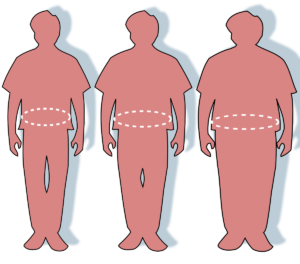Obesity is one of the most serious health issues of our time, and it’s only getting worse. According to the World Health Organization, more than 1.9 billion people are overweight or obese – that’s almost 40% of the global population. The dangers of being overweight or obese go far beyond just physical appearance. High levels of fat accumulate in your body and can lead to several other health issues from heart disease to type 2 diabetes. In this blog post, we’ll dive into what obesity is, its causes, and ways you can fight the battle against it. We will look at diet and exercise tips as well as life changes you can make to help reduce your risk of becoming obese or overweight.
Contents
What is Obesity?

There are many different ways to define obesity. Generally, it is defined as having too much body fat. This can be measured by using body mass index (BMI). BMI is a calculation that uses height and weight to estimate how much body fat someone has.
Being obese means having a BMI of 30 or higher. Obesity can also be diagnosed by looking at someone’s waist circumference. This is because people who are obese often have too much fat around their waist, which can lead to health problems.
Obesity increases your risk for many serious health conditions, including heart disease, stroke, type 2 diabetes, and certain types of cancer. It also can lead to joint problems and sleep apnea.
If you are obese, you can make changes to your lifestyle to help you lose weight and improve your health. These changes include eating a healthy diet and getting regular physical activity. You may also need medication or surgery to treat obesity-related health conditions.
Causes of Obesity
Obesity is a medical condition in which excess body fat has accumulated to the extent that it may hurt health. Being overweight and obesity are primarily caused by an energy imbalance between calories consumed and calories expended. When we consume more calories than we need over time, our bodies store the excess as body fat. The main contributor to this energy imbalance is eating too much – particularly foods high in fat and sugar.
Other factors that can contribute to the energy imbalance include:
- Sedentary lifestyle – too little physical activity can lead to weight gain because we burn fewer calories when we are inactive.
- Genetic factors – some people have a genetic predisposition to obesity, which means they are more likely to become obese if they eat the same amount of food and have the same level of physical activity as someone who does not have this predisposition.
- Endocrine disorders – conditions such as Cushing’s syndrome (a disorder of the adrenal glands), polycystic ovary syndrome (a hormonal disorder that can cause irregular periods, excess hair growth, and acne), and hypothyroidism (underactive thyroid) can cause weight gain.
- Medications – some medications, such as steroids and certain antidepressants, can increase the risk of weight gain. Also, certain medications can cause constipation, which can lead to weight gain.
- Sleep disorders – when we don’t get enough sleep, our bodies produce excess hormones that can make us feel hungrier and increase our appetite. This may lead to overeating and weight gain.
Health Risks Associated With Obesity

There are many health risks associated with obesity. These include heart disease, stroke, high blood pressure, diabetes, sleep apnea, and certain types of cancer.
Obesity is a major risk factor for heart disease. Heart disease is the leading cause of death in the world. Obesity is also a major risk factor for stroke. A stroke occurs when the blood supply to the brain is cut off. This can happen if a blood clot blocks an artery that supplies blood to the brain. A stroke can also be caused by bleeding in the brain. High blood pressure is another health risk associated with obesity.
Obesity can also lead to diabetes. Diabetes is a condition that occurs when the body cannot properly use insulin to convert sugar into energy. People with diabetes have an increased risk of heart disease, stroke, and amputation of limbs.
Sleep apnea is a condition that occurs when a person stops breathing for short periods during sleep. This can happen if the airway becomes blocked or if the person’s breathing muscles relax too much. Sleep apnea can lead to daytime sleepiness, high blood pressure, and heart disease.
Certain types of cancer are also linked to obesity. These include cancer of the breast, uterus, ovaries, gallbladder, pancreas, and colon. Sometimes, obesity can also lead to joint problems and sleep apnea.
Obesity and Fertility
The Centers for Disease Control and Prevention (CDC) report that one-third of all adults are obese. An individual is considered obese when their body mass index (BMI) is 30 or greater. Obesity increases the risk for several health conditions, including infertility.
Obesity can affect fertility in both men and women. In men, obesity can lead to low testosterone levels, which can impact sperm production. Obesity can also cause erectile dysfunction. In women, obesity can interfere with ovulation and make it more difficult to become pregnant. Obesity is also associated with an increased risk of miscarriage.
Some of the most effective treatments for obesity-related fertility issues are weight loss and physical activity. Losing even a small amount of weight can help improve fertility. Exercise is also important for improving fertility and overall health.
How To Treat Obesity?

Obesity is a medical condition that requires treatment. There are many ways to treat obesity, and the most effective approach depends on the individual.
Diet and exercise are essential components of any obesity treatment plan. A healthy diet helps to reduce calorie intake and improve nutrition, while exercise helps to burn calories and build muscle mass.
Medications for obesity treatment can have side effects, so they should be used only if lifestyle changes alone are not effective in achieving weight loss. The most common medications used to treat obesity are appetite suppressants, fat absorption inhibitors, and metabolism boosters.
Surgery is an option for some people with severe obesity who have not been able to lose weight through other methods. The most common type of surgery for obesity is gastric bypass surgery, which reduces the size of the stomach and allows food to bypass part of the small intestine.
Conclusion
Obesity is a serious health issue that can have long-term consequences. It’s important to understand the causes, risk factors, and effects of obesity so that it can be effectively managed or even prevented. There are many potential treatments available to help manage obesity including lifestyle changes such as diet and exercise, medications, weight loss surgeries, and other medical treatments. With the right combination of care and support, people with obesity can make positive strides toward better health for themselves and their families.
Consider contacting FitMantra for additional information on nutrition and fitness. You can also get in touch with their nutrition experts through our online nutrition counseling, who can guide you through the process and help you achieve your fitness goals. You can also lose weight with the help of our weight loss program. Download our Fitness app on Android to learn more about us.
